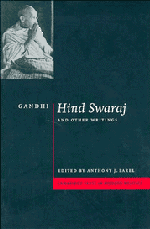Book contents
- Frontmatter
- Contents
- Acknowledgements
- Editor's introduction
- A note on the history of the text
- Principal events in Gandhi's life
- Biographical synopses
- Guide to further reading
- Glossary and list of abbreviations
- HIND SWARAJ
- Preface to the English translation
- Foreword
- I The Congress and its officials
- II The Partition of Bengal
- III Discontent and unrest
- IV What is Swaraj?
- V The condition of England
- VI Civilisation
- VII Why was India lost?
- VIII The condition of India
- IX The conditions of India (cont.): railways
- X The condition of India (cont.): the Hindus and the Mahomedans
- XI The condition of India (cont.): lawyers
- XII The conditions of India (cont.): doctors
- XIII What is true civilisation?
- XIV How can India become free?
- XV Italy and India
- XVI Brute force
- XVII Passive resistance
- XVIII Education
- XIX Machinery
- XX Conclusion
- APPENDICES
- SUPPLEMENTARY WRITINGS
- Bibliography
- Index
VII - Why was India lost?
Published online by Cambridge University Press: 10 November 2010
- Frontmatter
- Contents
- Acknowledgements
- Editor's introduction
- A note on the history of the text
- Principal events in Gandhi's life
- Biographical synopses
- Guide to further reading
- Glossary and list of abbreviations
- HIND SWARAJ
- Preface to the English translation
- Foreword
- I The Congress and its officials
- II The Partition of Bengal
- III Discontent and unrest
- IV What is Swaraj?
- V The condition of England
- VI Civilisation
- VII Why was India lost?
- VIII The condition of India
- IX The conditions of India (cont.): railways
- X The condition of India (cont.): the Hindus and the Mahomedans
- XI The condition of India (cont.): lawyers
- XII The conditions of India (cont.): doctors
- XIII What is true civilisation?
- XIV How can India become free?
- XV Italy and India
- XVI Brute force
- XVII Passive resistance
- XVIII Education
- XIX Machinery
- XX Conclusion
- APPENDICES
- SUPPLEMENTARY WRITINGS
- Bibliography
- Index
Summary
reader: You have said much about civilisation – enough to make me ponder over it. I do not now know what I should adopt and what I should avoid from the nations of Europe, but one question comes to my lips immediately. If civilisation is a disease, and if it has attacked the English nation, why has she been able to take India, and why is she able to retain it?
editor: Your question is not very difficult to answer, and we shall presently be able to examine the true nature of Swaraj; for I am aware that I have still to answer that question. I will, however, take up your previous question. The English have not taken India; we have given it to them. They are not in India because of their strength, but because we keep them. Let us now see whether these propositions can be sustained. They came to our country originally for purposes of trade. Recall the Company Bahadur. Who made it Bahadur? They had not the slightest intention at the time of establishing a kingdom. Who assisted the Company's officers? Who was tempted at the sight of their silver? Who bought their goods? History testifies that we did all this. In order to become rich all at once, we welcomed the Company's officers with open arms. We assisted them. If I am in the habit of drinking Bhang, and a seller thereof sells it to me, am I to blame him or myself?
- Type
- Chapter
- Information
- Gandhi: 'Hind Swaraj' and Other Writings , pp. 39 - 41Publisher: Cambridge University PressPrint publication year: 1997

